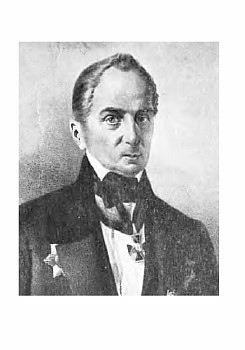|
- - - -
Venceslav Pelikan
PELICAN Ventseslav Ventseslavovich
(09/23/1790 - 21/06/1873)
Physician, statesman and public figure, reformer of veterinary affairs in Russia
Ventseslav Pelican was born in the town of Slonim, Grodno region. In 1807 he graduated from a local high school, in 1809 he studied at Vilnius University. In 1813 he graduated from St. Petersburg Medical-Surgical Academy, where he worked later. In 1816 Pelican received his doctorate in medicine and surgery. Since 1817 he was a professor of theoretical and practical surgery, since 1820 - a professor of anatomy at Vilnius University. Since 1824 Pelican was the dean of the medical faculty, in 1826-1831 - the rector of Vilnius University. In 1824 he became the chairman of a special committee which worked out new charters for schools in Vilna educational district and at Vilnius University. In 1829 Pelican became the chairman of the Main seminary and Vilna censorship committee. Since 1832 he was a member of the Medical Board at the Ministry of Internal Affairs of Russia. From 1838 he was the chief doctor of Moscow Military Hospital, since 1846 – the director of the Medical Department at the Military Ministry of Russia, in 1847 - the chairman of the interim veterinary committee. In 1851-1856 Pelican was the president of St. Petersburg Medical-Surgical Academy, where he first began to hold academic research conferences. Since 1865 he was the chairman of the Military Medical Scientific Committee, since 1869 – the chairman of the veterinary committee.
Pelican performed sophisticated for that time operations on the vessels in the head and neck, designed and improved a number of surgical instruments, which greatly facilitated the work of specialists. He managed to advance veterinary education in Russia, to improve veterinary situation in the army, encouraged the establishment of the corps veterinarians’ positions in the armed forces, supported army surgeons’ upgrading, medicine provision for hospitals and troops, the establishment of military medical libraries, the secondment of young doctors at clinics and their training abroad. In 1866 Pelican provided the introduction of the first Russian pharmacopoeia in two parts, which replaced an obsolete Latin analogue and significantly improved the pharmaceutical business in Russia. Pelican is the author of scholarly works on anatomy and surgery, a treatise on the use of electricity in medicine, numerous articles in periodicals, textbooks on anatomy, "Myology, or the Science of Muscles of the Human Body" (1823). He also participated in founding "Archives of Veterinary Science", the first veterinary press organ in Russia. Pelican was a member of the Vilna and Warsaw Medical Societies, the Kiev Medical Association, Kurland Society of Literature and Science. He was awarded the Order of St. Anne's I, II degree, St. Vladimir III degree, St. Stanislaus I degree, the Holy Prince Vladimir II degree, two Orders of St. Alexander Nevsky. In 1870 his activity was awarded with the highest title of Russian officials - the full privy councillor. He died and was buried in the estate of Pelicany in Braslav district, Vitebsk region.
Works:
1. Myologia czyli nauka o muszkulach ciala ludzkiego, dla uzytku uczacych sie w cesarskim Uniwersytecie wilenskim. Wilno, 1823.
Literature:
1. Bielinski J. Uniwersytet Wilenski (1579–1831). T. III. Krakow: Druk W. L. Anczyca i Sp., 1899–1900. S. 87–92.
2. Дарошка М. I. Пелiкан Вацлаў Вацлававiч // Мыслiцелi i асветнiкi Беларусi: Энцыклапедычны даведнік. Мінск: Беларуская Энцыклапедыя, 1995. С. 524.
3. Мирский М.Б. Пеликан Венцеслав Венцеславович // Медицина России XVI–XIX веков. М.: Росспэн, 1996. С. 208–216.

© National Academy of Sciences of Belarus, 2011
|
|


